Disruptive Technology: Trends in Australian Hotel & Hospitality
VerifiedAdded on 2023/06/09
|12
|2862
|103
Report
AI Summary
This report examines the impact, role, and future trends of disruptive technology in the Australian hotel and hospitality industry. It begins with an overview of the Australian hotel sector, highlighting its economic contribution and increasing competition. The report then delves into the impact of disruptive innovation, focusing on Online Travel Agents (OTAs) and Airbnb, along with the role of social media. It discusses both the positive and negative impacts of these technologies, including increased customer satisfaction and potential cyber-attacks. Furthermore, the report analyzes how disruptive technology meets customer expectations, ensures price transparency, enhances communication, and facilitates work distribution. Finally, it explores future trends like video conferencing, virtual reality, smart keys, infrared sensors, and robotics, emphasizing their potential to revolutionize customer engagement and operational efficiency. Desklib provides access to similar solved assignments and resources for students.
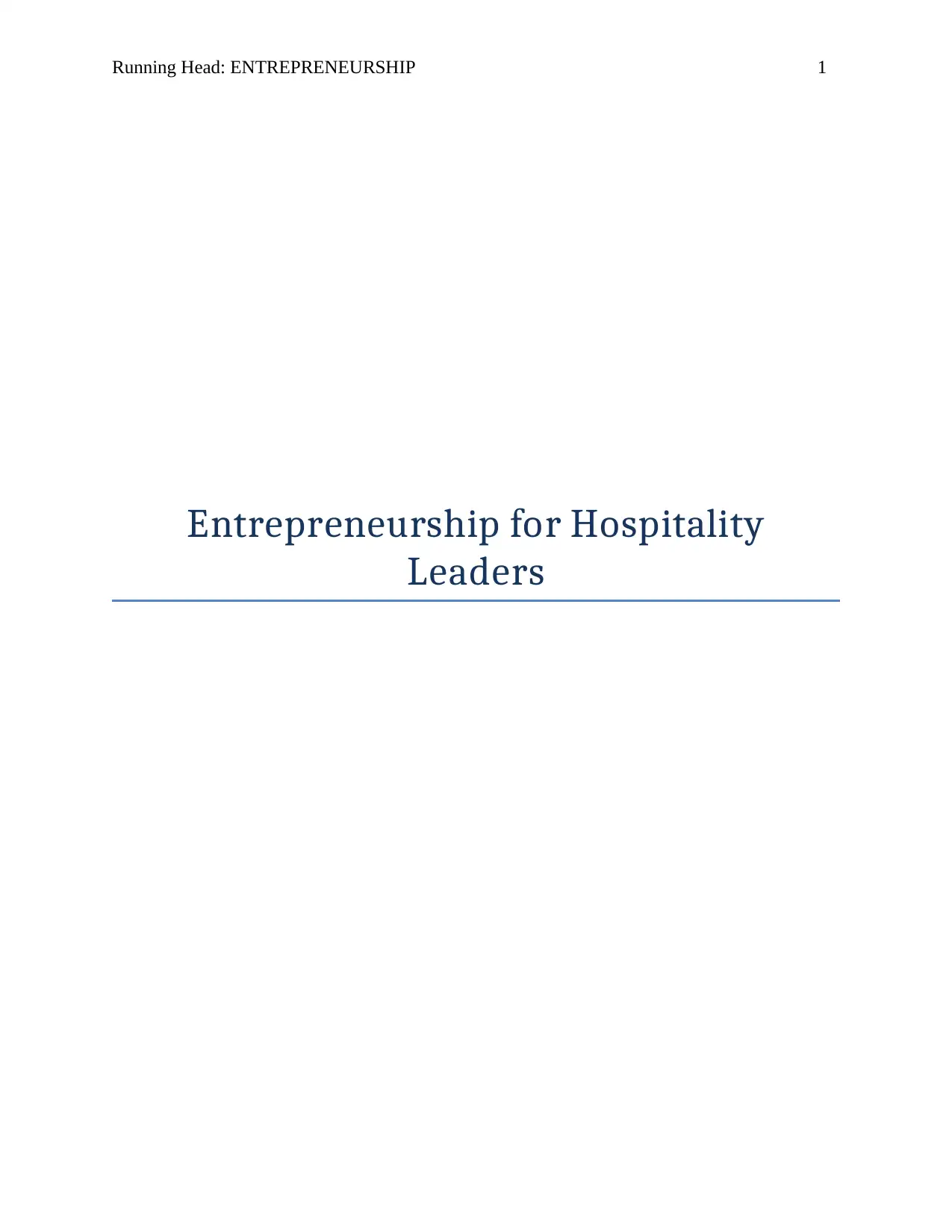
Running Head: ENTREPRENEURSHIP 1
Entrepreneurship for Hospitality
Leaders
Entrepreneurship for Hospitality
Leaders
Paraphrase This Document
Need a fresh take? Get an instant paraphrase of this document with our AI Paraphraser
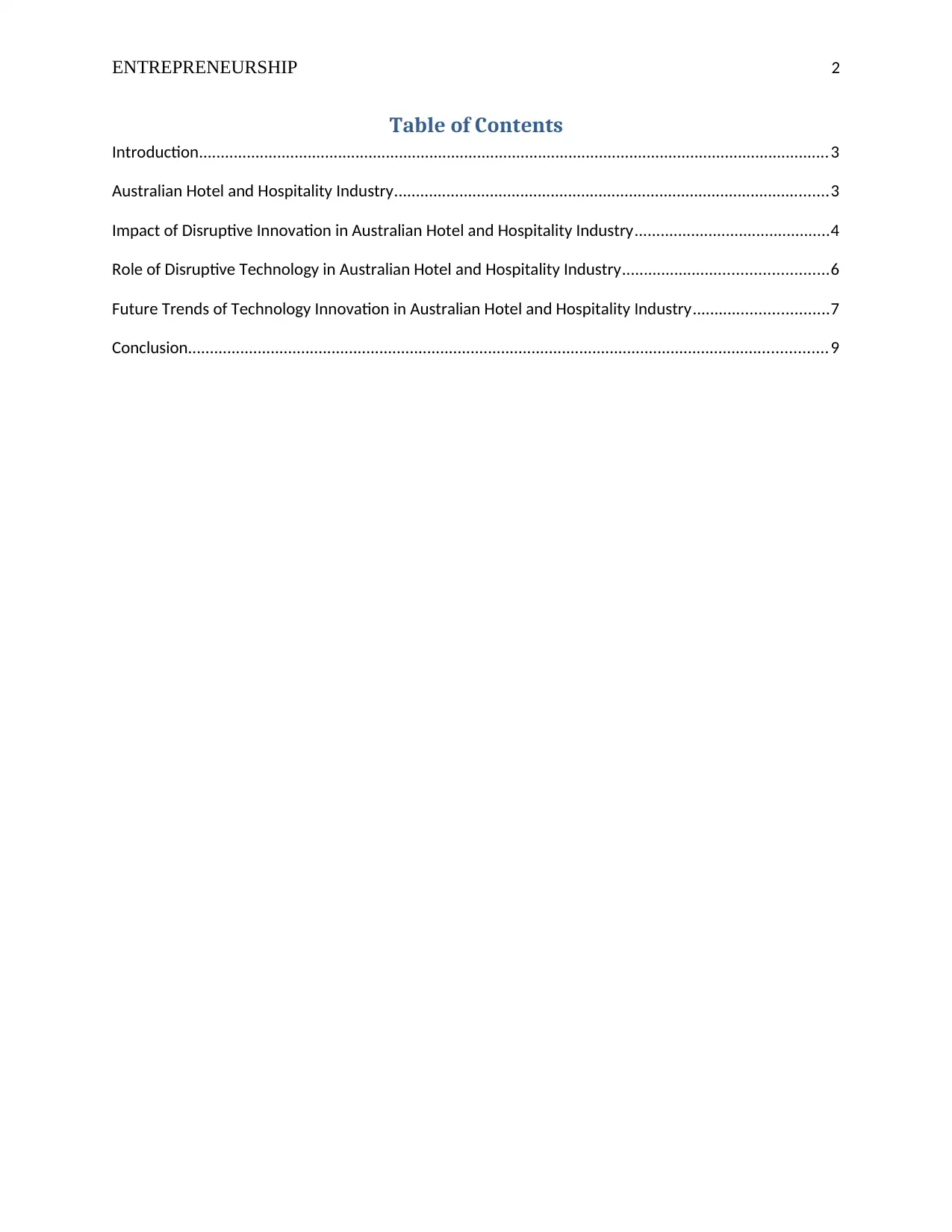
ENTREPRENEURSHIP 2
Table of Contents
Introduction.................................................................................................................................................3
Australian Hotel and Hospitality Industry....................................................................................................3
Impact of Disruptive Innovation in Australian Hotel and Hospitality Industry.............................................4
Role of Disruptive Technology in Australian Hotel and Hospitality Industry...............................................6
Future Trends of Technology Innovation in Australian Hotel and Hospitality Industry...............................7
Conclusion...................................................................................................................................................9
Table of Contents
Introduction.................................................................................................................................................3
Australian Hotel and Hospitality Industry....................................................................................................3
Impact of Disruptive Innovation in Australian Hotel and Hospitality Industry.............................................4
Role of Disruptive Technology in Australian Hotel and Hospitality Industry...............................................6
Future Trends of Technology Innovation in Australian Hotel and Hospitality Industry...............................7
Conclusion...................................................................................................................................................9
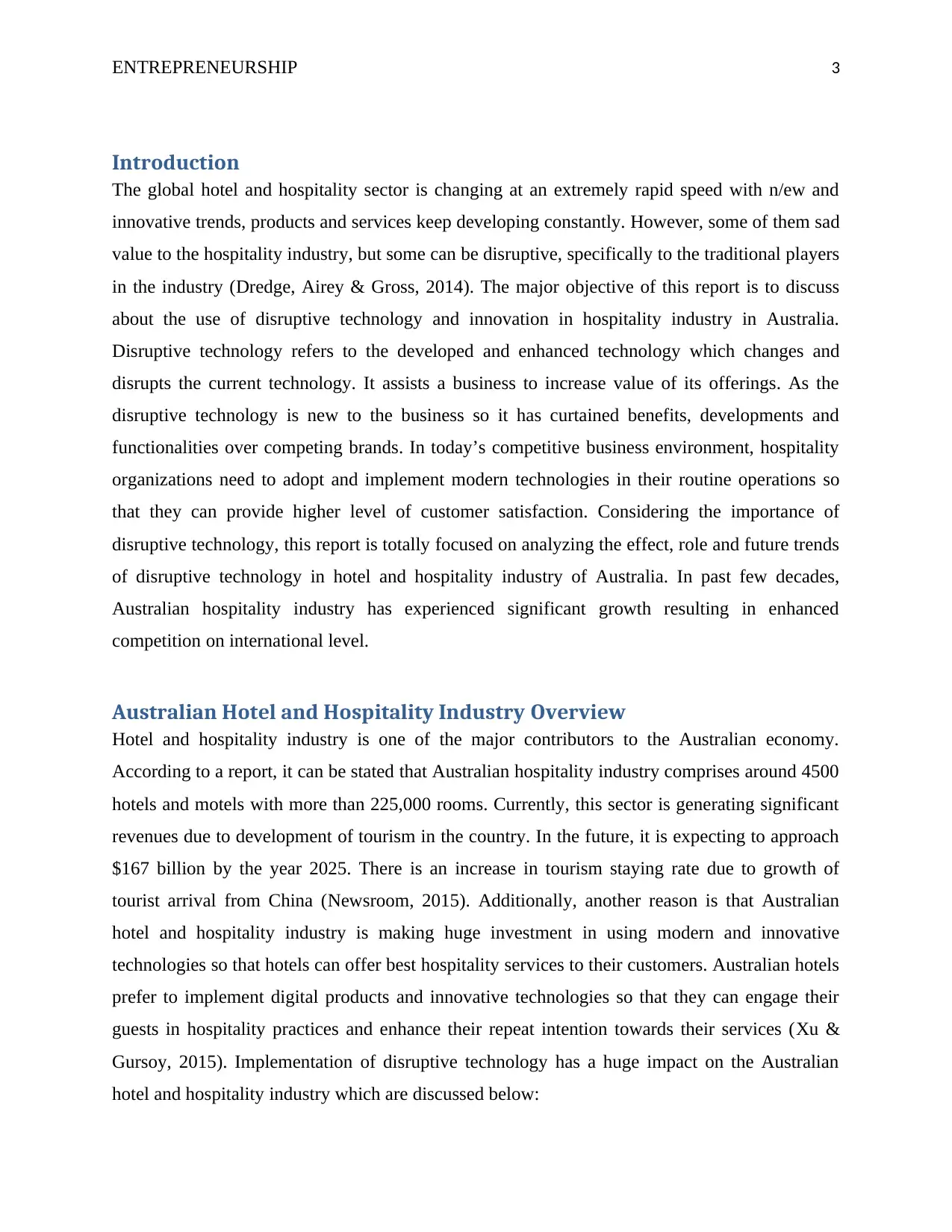
ENTREPRENEURSHIP 3
Introduction
The global hotel and hospitality sector is changing at an extremely rapid speed with n/ew and
innovative trends, products and services keep developing constantly. However, some of them sad
value to the hospitality industry, but some can be disruptive, specifically to the traditional players
in the industry (Dredge, Airey & Gross, 2014). The major objective of this report is to discuss
about the use of disruptive technology and innovation in hospitality industry in Australia.
Disruptive technology refers to the developed and enhanced technology which changes and
disrupts the current technology. It assists a business to increase value of its offerings. As the
disruptive technology is new to the business so it has curtained benefits, developments and
functionalities over competing brands. In today’s competitive business environment, hospitality
organizations need to adopt and implement modern technologies in their routine operations so
that they can provide higher level of customer satisfaction. Considering the importance of
disruptive technology, this report is totally focused on analyzing the effect, role and future trends
of disruptive technology in hotel and hospitality industry of Australia. In past few decades,
Australian hospitality industry has experienced significant growth resulting in enhanced
competition on international level.
Australian Hotel and Hospitality Industry Overview
Hotel and hospitality industry is one of the major contributors to the Australian economy.
According to a report, it can be stated that Australian hospitality industry comprises around 4500
hotels and motels with more than 225,000 rooms. Currently, this sector is generating significant
revenues due to development of tourism in the country. In the future, it is expecting to approach
$167 billion by the year 2025. There is an increase in tourism staying rate due to growth of
tourist arrival from China (Newsroom, 2015). Additionally, another reason is that Australian
hotel and hospitality industry is making huge investment in using modern and innovative
technologies so that hotels can offer best hospitality services to their customers. Australian hotels
prefer to implement digital products and innovative technologies so that they can engage their
guests in hospitality practices and enhance their repeat intention towards their services (Xu &
Gursoy, 2015). Implementation of disruptive technology has a huge impact on the Australian
hotel and hospitality industry which are discussed below:
Introduction
The global hotel and hospitality sector is changing at an extremely rapid speed with n/ew and
innovative trends, products and services keep developing constantly. However, some of them sad
value to the hospitality industry, but some can be disruptive, specifically to the traditional players
in the industry (Dredge, Airey & Gross, 2014). The major objective of this report is to discuss
about the use of disruptive technology and innovation in hospitality industry in Australia.
Disruptive technology refers to the developed and enhanced technology which changes and
disrupts the current technology. It assists a business to increase value of its offerings. As the
disruptive technology is new to the business so it has curtained benefits, developments and
functionalities over competing brands. In today’s competitive business environment, hospitality
organizations need to adopt and implement modern technologies in their routine operations so
that they can provide higher level of customer satisfaction. Considering the importance of
disruptive technology, this report is totally focused on analyzing the effect, role and future trends
of disruptive technology in hotel and hospitality industry of Australia. In past few decades,
Australian hospitality industry has experienced significant growth resulting in enhanced
competition on international level.
Australian Hotel and Hospitality Industry Overview
Hotel and hospitality industry is one of the major contributors to the Australian economy.
According to a report, it can be stated that Australian hospitality industry comprises around 4500
hotels and motels with more than 225,000 rooms. Currently, this sector is generating significant
revenues due to development of tourism in the country. In the future, it is expecting to approach
$167 billion by the year 2025. There is an increase in tourism staying rate due to growth of
tourist arrival from China (Newsroom, 2015). Additionally, another reason is that Australian
hotel and hospitality industry is making huge investment in using modern and innovative
technologies so that hotels can offer best hospitality services to their customers. Australian hotels
prefer to implement digital products and innovative technologies so that they can engage their
guests in hospitality practices and enhance their repeat intention towards their services (Xu &
Gursoy, 2015). Implementation of disruptive technology has a huge impact on the Australian
hotel and hospitality industry which are discussed below:
⊘ This is a preview!⊘
Do you want full access?
Subscribe today to unlock all pages.

Trusted by 1+ million students worldwide
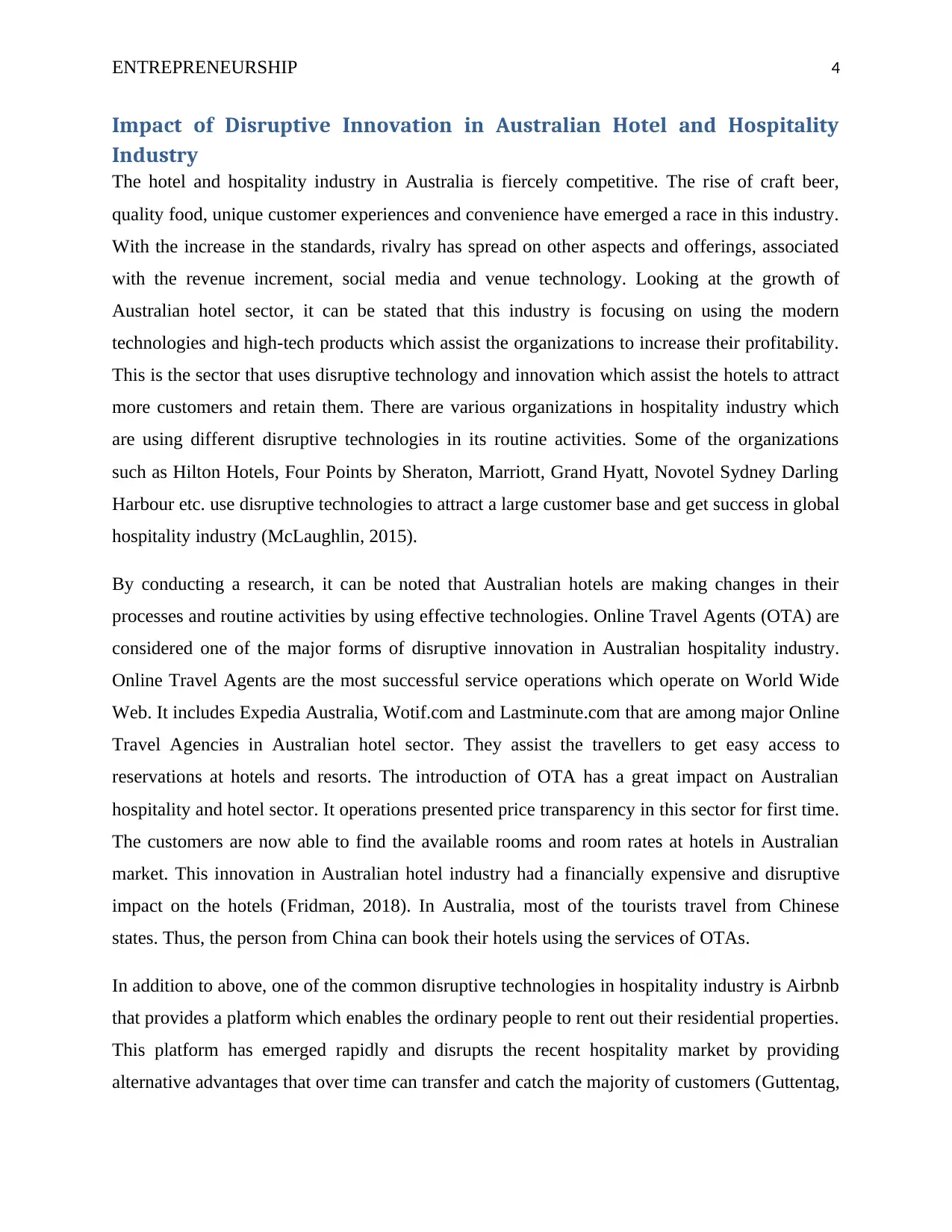
ENTREPRENEURSHIP 4
Impact of Disruptive Innovation in Australian Hotel and Hospitality
Industry
The hotel and hospitality industry in Australia is fiercely competitive. The rise of craft beer,
quality food, unique customer experiences and convenience have emerged a race in this industry.
With the increase in the standards, rivalry has spread on other aspects and offerings, associated
with the revenue increment, social media and venue technology. Looking at the growth of
Australian hotel sector, it can be stated that this industry is focusing on using the modern
technologies and high-tech products which assist the organizations to increase their profitability.
This is the sector that uses disruptive technology and innovation which assist the hotels to attract
more customers and retain them. There are various organizations in hospitality industry which
are using different disruptive technologies in its routine activities. Some of the organizations
such as Hilton Hotels, Four Points by Sheraton, Marriott, Grand Hyatt, Novotel Sydney Darling
Harbour etc. use disruptive technologies to attract a large customer base and get success in global
hospitality industry (McLaughlin, 2015).
By conducting a research, it can be noted that Australian hotels are making changes in their
processes and routine activities by using effective technologies. Online Travel Agents (OTA) are
considered one of the major forms of disruptive innovation in Australian hospitality industry.
Online Travel Agents are the most successful service operations which operate on World Wide
Web. It includes Expedia Australia, Wotif.com and Lastminute.com that are among major Online
Travel Agencies in Australian hotel sector. They assist the travellers to get easy access to
reservations at hotels and resorts. The introduction of OTA has a great impact on Australian
hospitality and hotel sector. It operations presented price transparency in this sector for first time.
The customers are now able to find the available rooms and room rates at hotels in Australian
market. This innovation in Australian hotel industry had a financially expensive and disruptive
impact on the hotels (Fridman, 2018). In Australia, most of the tourists travel from Chinese
states. Thus, the person from China can book their hotels using the services of OTAs.
In addition to above, one of the common disruptive technologies in hospitality industry is Airbnb
that provides a platform which enables the ordinary people to rent out their residential properties.
This platform has emerged rapidly and disrupts the recent hospitality market by providing
alternative advantages that over time can transfer and catch the majority of customers (Guttentag,
Impact of Disruptive Innovation in Australian Hotel and Hospitality
Industry
The hotel and hospitality industry in Australia is fiercely competitive. The rise of craft beer,
quality food, unique customer experiences and convenience have emerged a race in this industry.
With the increase in the standards, rivalry has spread on other aspects and offerings, associated
with the revenue increment, social media and venue technology. Looking at the growth of
Australian hotel sector, it can be stated that this industry is focusing on using the modern
technologies and high-tech products which assist the organizations to increase their profitability.
This is the sector that uses disruptive technology and innovation which assist the hotels to attract
more customers and retain them. There are various organizations in hospitality industry which
are using different disruptive technologies in its routine activities. Some of the organizations
such as Hilton Hotels, Four Points by Sheraton, Marriott, Grand Hyatt, Novotel Sydney Darling
Harbour etc. use disruptive technologies to attract a large customer base and get success in global
hospitality industry (McLaughlin, 2015).
By conducting a research, it can be noted that Australian hotels are making changes in their
processes and routine activities by using effective technologies. Online Travel Agents (OTA) are
considered one of the major forms of disruptive innovation in Australian hospitality industry.
Online Travel Agents are the most successful service operations which operate on World Wide
Web. It includes Expedia Australia, Wotif.com and Lastminute.com that are among major Online
Travel Agencies in Australian hotel sector. They assist the travellers to get easy access to
reservations at hotels and resorts. The introduction of OTA has a great impact on Australian
hospitality and hotel sector. It operations presented price transparency in this sector for first time.
The customers are now able to find the available rooms and room rates at hotels in Australian
market. This innovation in Australian hotel industry had a financially expensive and disruptive
impact on the hotels (Fridman, 2018). In Australia, most of the tourists travel from Chinese
states. Thus, the person from China can book their hotels using the services of OTAs.
In addition to above, one of the common disruptive technologies in hospitality industry is Airbnb
that provides a platform which enables the ordinary people to rent out their residential properties.
This platform has emerged rapidly and disrupts the recent hospitality market by providing
alternative advantages that over time can transfer and catch the majority of customers (Guttentag,
Paraphrase This Document
Need a fresh take? Get an instant paraphrase of this document with our AI Paraphraser
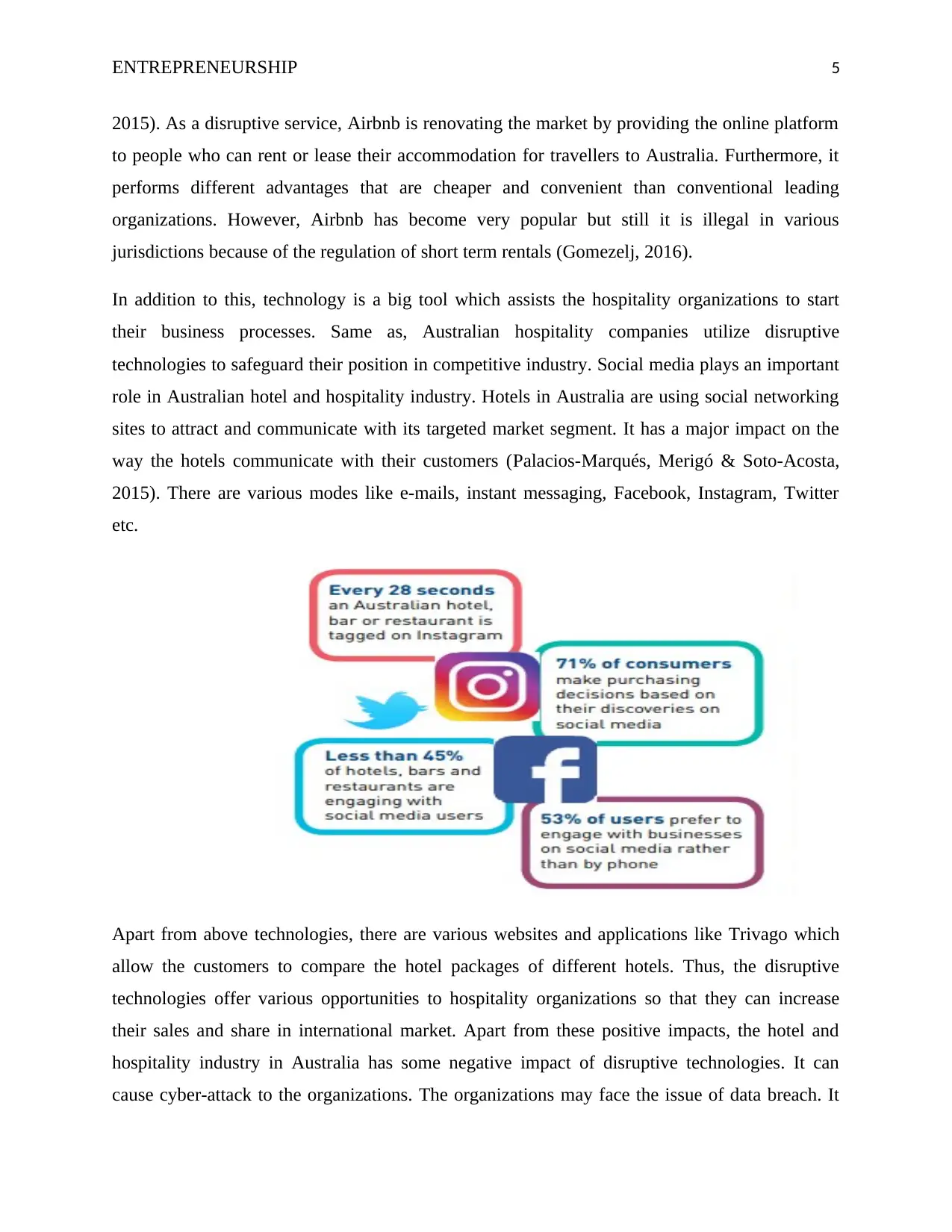
ENTREPRENEURSHIP 5
2015). As a disruptive service, Airbnb is renovating the market by providing the online platform
to people who can rent or lease their accommodation for travellers to Australia. Furthermore, it
performs different advantages that are cheaper and convenient than conventional leading
organizations. However, Airbnb has become very popular but still it is illegal in various
jurisdictions because of the regulation of short term rentals (Gomezelj, 2016).
In addition to this, technology is a big tool which assists the hospitality organizations to start
their business processes. Same as, Australian hospitality companies utilize disruptive
technologies to safeguard their position in competitive industry. Social media plays an important
role in Australian hotel and hospitality industry. Hotels in Australia are using social networking
sites to attract and communicate with its targeted market segment. It has a major impact on the
way the hotels communicate with their customers (Palacios-Marqués, Merigó & Soto-Acosta,
2015). There are various modes like e-mails, instant messaging, Facebook, Instagram, Twitter
etc.
Apart from above technologies, there are various websites and applications like Trivago which
allow the customers to compare the hotel packages of different hotels. Thus, the disruptive
technologies offer various opportunities to hospitality organizations so that they can increase
their sales and share in international market. Apart from these positive impacts, the hotel and
hospitality industry in Australia has some negative impact of disruptive technologies. It can
cause cyber-attack to the organizations. The organizations may face the issue of data breach. It
2015). As a disruptive service, Airbnb is renovating the market by providing the online platform
to people who can rent or lease their accommodation for travellers to Australia. Furthermore, it
performs different advantages that are cheaper and convenient than conventional leading
organizations. However, Airbnb has become very popular but still it is illegal in various
jurisdictions because of the regulation of short term rentals (Gomezelj, 2016).
In addition to this, technology is a big tool which assists the hospitality organizations to start
their business processes. Same as, Australian hospitality companies utilize disruptive
technologies to safeguard their position in competitive industry. Social media plays an important
role in Australian hotel and hospitality industry. Hotels in Australia are using social networking
sites to attract and communicate with its targeted market segment. It has a major impact on the
way the hotels communicate with their customers (Palacios-Marqués, Merigó & Soto-Acosta,
2015). There are various modes like e-mails, instant messaging, Facebook, Instagram, Twitter
etc.
Apart from above technologies, there are various websites and applications like Trivago which
allow the customers to compare the hotel packages of different hotels. Thus, the disruptive
technologies offer various opportunities to hospitality organizations so that they can increase
their sales and share in international market. Apart from these positive impacts, the hotel and
hospitality industry in Australia has some negative impact of disruptive technologies. It can
cause cyber-attack to the organizations. The organizations may face the issue of data breach. It
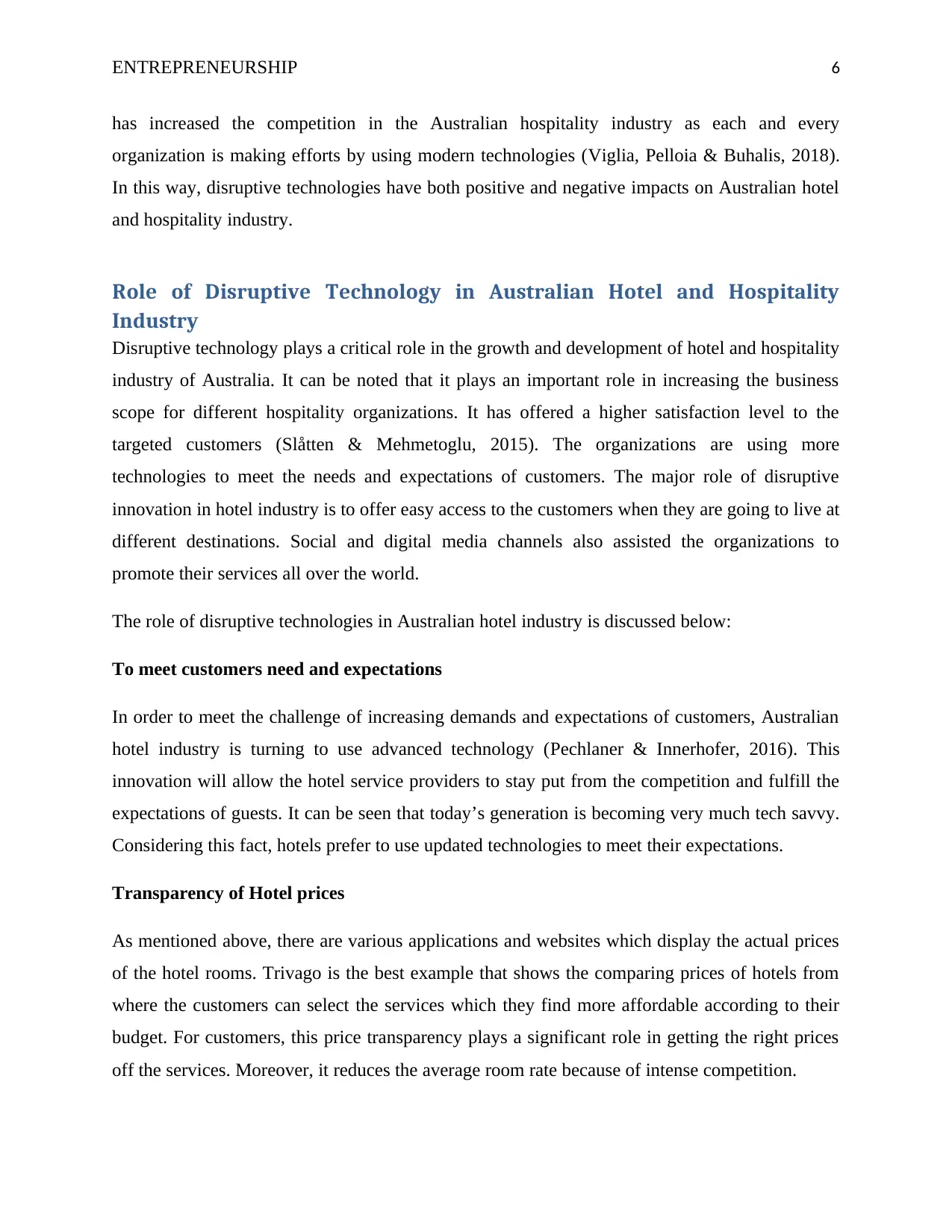
ENTREPRENEURSHIP 6
has increased the competition in the Australian hospitality industry as each and every
organization is making efforts by using modern technologies (Viglia, Pelloia & Buhalis, 2018).
In this way, disruptive technologies have both positive and negative impacts on Australian hotel
and hospitality industry.
Role of Disruptive Technology in Australian Hotel and Hospitality
Industry
Disruptive technology plays a critical role in the growth and development of hotel and hospitality
industry of Australia. It can be noted that it plays an important role in increasing the business
scope for different hospitality organizations. It has offered a higher satisfaction level to the
targeted customers (Slåtten & Mehmetoglu, 2015). The organizations are using more
technologies to meet the needs and expectations of customers. The major role of disruptive
innovation in hotel industry is to offer easy access to the customers when they are going to live at
different destinations. Social and digital media channels also assisted the organizations to
promote their services all over the world.
The role of disruptive technologies in Australian hotel industry is discussed below:
To meet customers need and expectations
In order to meet the challenge of increasing demands and expectations of customers, Australian
hotel industry is turning to use advanced technology (Pechlaner & Innerhofer, 2016). This
innovation will allow the hotel service providers to stay put from the competition and fulfill the
expectations of guests. It can be seen that today’s generation is becoming very much tech savvy.
Considering this fact, hotels prefer to use updated technologies to meet their expectations.
Transparency of Hotel prices
As mentioned above, there are various applications and websites which display the actual prices
of the hotel rooms. Trivago is the best example that shows the comparing prices of hotels from
where the customers can select the services which they find more affordable according to their
budget. For customers, this price transparency plays a significant role in getting the right prices
off the services. Moreover, it reduces the average room rate because of intense competition.
has increased the competition in the Australian hospitality industry as each and every
organization is making efforts by using modern technologies (Viglia, Pelloia & Buhalis, 2018).
In this way, disruptive technologies have both positive and negative impacts on Australian hotel
and hospitality industry.
Role of Disruptive Technology in Australian Hotel and Hospitality
Industry
Disruptive technology plays a critical role in the growth and development of hotel and hospitality
industry of Australia. It can be noted that it plays an important role in increasing the business
scope for different hospitality organizations. It has offered a higher satisfaction level to the
targeted customers (Slåtten & Mehmetoglu, 2015). The organizations are using more
technologies to meet the needs and expectations of customers. The major role of disruptive
innovation in hotel industry is to offer easy access to the customers when they are going to live at
different destinations. Social and digital media channels also assisted the organizations to
promote their services all over the world.
The role of disruptive technologies in Australian hotel industry is discussed below:
To meet customers need and expectations
In order to meet the challenge of increasing demands and expectations of customers, Australian
hotel industry is turning to use advanced technology (Pechlaner & Innerhofer, 2016). This
innovation will allow the hotel service providers to stay put from the competition and fulfill the
expectations of guests. It can be seen that today’s generation is becoming very much tech savvy.
Considering this fact, hotels prefer to use updated technologies to meet their expectations.
Transparency of Hotel prices
As mentioned above, there are various applications and websites which display the actual prices
of the hotel rooms. Trivago is the best example that shows the comparing prices of hotels from
where the customers can select the services which they find more affordable according to their
budget. For customers, this price transparency plays a significant role in getting the right prices
off the services. Moreover, it reduces the average room rate because of intense competition.
⊘ This is a preview!⊘
Do you want full access?
Subscribe today to unlock all pages.

Trusted by 1+ million students worldwide
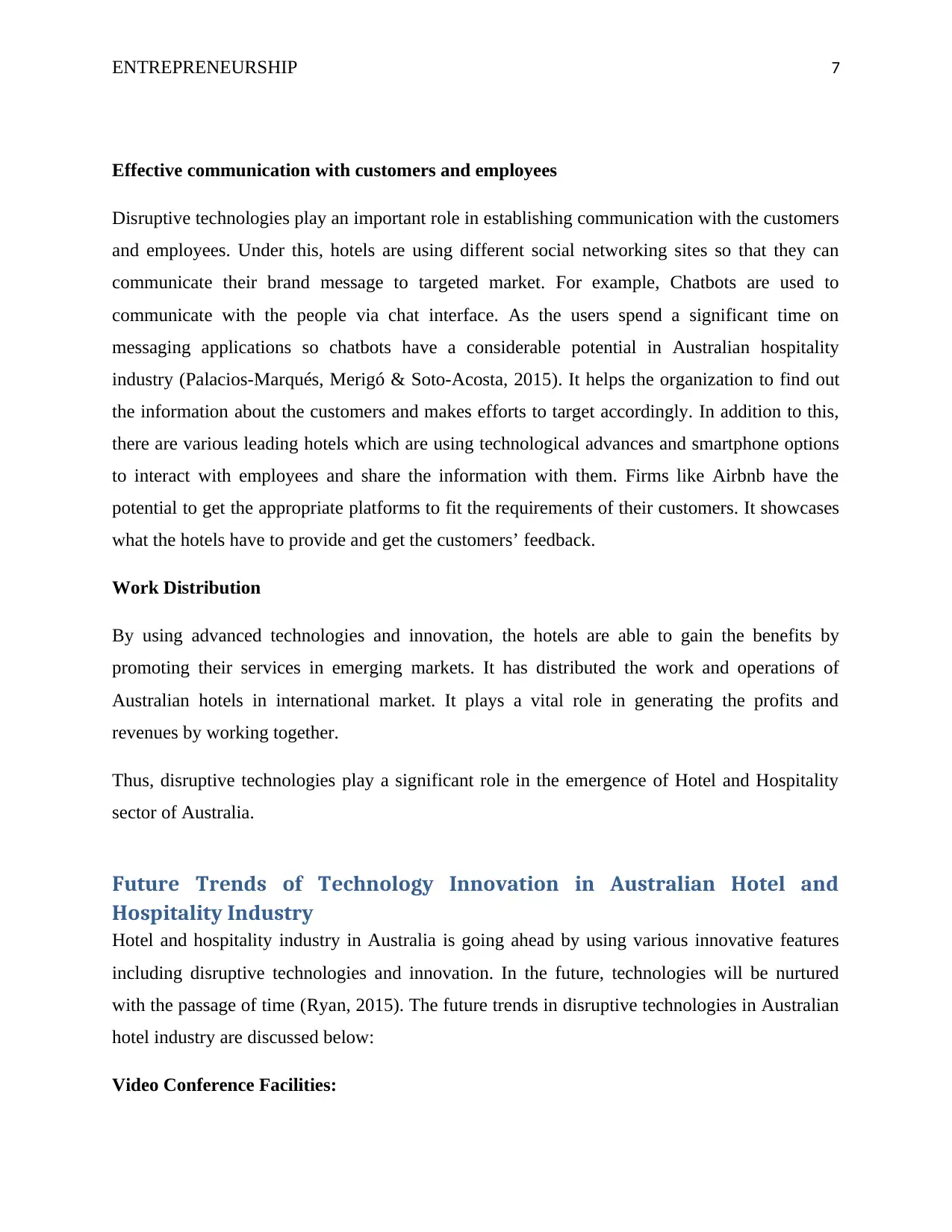
ENTREPRENEURSHIP 7
Effective communication with customers and employees
Disruptive technologies play an important role in establishing communication with the customers
and employees. Under this, hotels are using different social networking sites so that they can
communicate their brand message to targeted market. For example, Chatbots are used to
communicate with the people via chat interface. As the users spend a significant time on
messaging applications so chatbots have a considerable potential in Australian hospitality
industry (Palacios-Marqués, Merigó & Soto-Acosta, 2015). It helps the organization to find out
the information about the customers and makes efforts to target accordingly. In addition to this,
there are various leading hotels which are using technological advances and smartphone options
to interact with employees and share the information with them. Firms like Airbnb have the
potential to get the appropriate platforms to fit the requirements of their customers. It showcases
what the hotels have to provide and get the customers’ feedback.
Work Distribution
By using advanced technologies and innovation, the hotels are able to gain the benefits by
promoting their services in emerging markets. It has distributed the work and operations of
Australian hotels in international market. It plays a vital role in generating the profits and
revenues by working together.
Thus, disruptive technologies play a significant role in the emergence of Hotel and Hospitality
sector of Australia.
Future Trends of Technology Innovation in Australian Hotel and
Hospitality Industry
Hotel and hospitality industry in Australia is going ahead by using various innovative features
including disruptive technologies and innovation. In the future, technologies will be nurtured
with the passage of time (Ryan, 2015). The future trends in disruptive technologies in Australian
hotel industry are discussed below:
Video Conference Facilities:
Effective communication with customers and employees
Disruptive technologies play an important role in establishing communication with the customers
and employees. Under this, hotels are using different social networking sites so that they can
communicate their brand message to targeted market. For example, Chatbots are used to
communicate with the people via chat interface. As the users spend a significant time on
messaging applications so chatbots have a considerable potential in Australian hospitality
industry (Palacios-Marqués, Merigó & Soto-Acosta, 2015). It helps the organization to find out
the information about the customers and makes efforts to target accordingly. In addition to this,
there are various leading hotels which are using technological advances and smartphone options
to interact with employees and share the information with them. Firms like Airbnb have the
potential to get the appropriate platforms to fit the requirements of their customers. It showcases
what the hotels have to provide and get the customers’ feedback.
Work Distribution
By using advanced technologies and innovation, the hotels are able to gain the benefits by
promoting their services in emerging markets. It has distributed the work and operations of
Australian hotels in international market. It plays a vital role in generating the profits and
revenues by working together.
Thus, disruptive technologies play a significant role in the emergence of Hotel and Hospitality
sector of Australia.
Future Trends of Technology Innovation in Australian Hotel and
Hospitality Industry
Hotel and hospitality industry in Australia is going ahead by using various innovative features
including disruptive technologies and innovation. In the future, technologies will be nurtured
with the passage of time (Ryan, 2015). The future trends in disruptive technologies in Australian
hotel industry are discussed below:
Video Conference Facilities:
Paraphrase This Document
Need a fresh take? Get an instant paraphrase of this document with our AI Paraphraser
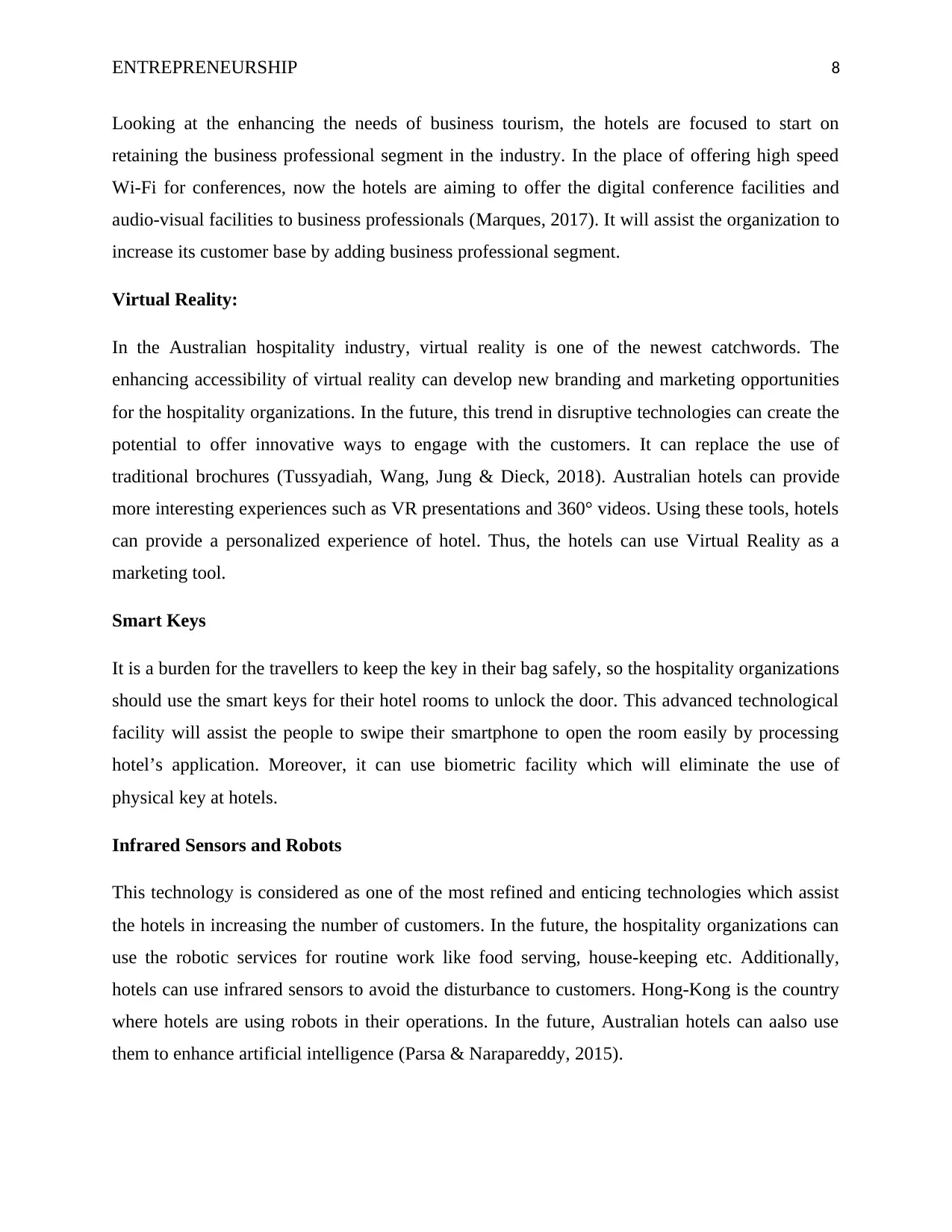
ENTREPRENEURSHIP 8
Looking at the enhancing the needs of business tourism, the hotels are focused to start on
retaining the business professional segment in the industry. In the place of offering high speed
Wi-Fi for conferences, now the hotels are aiming to offer the digital conference facilities and
audio-visual facilities to business professionals (Marques, 2017). It will assist the organization to
increase its customer base by adding business professional segment.
Virtual Reality:
In the Australian hospitality industry, virtual reality is one of the newest catchwords. The
enhancing accessibility of virtual reality can develop new branding and marketing opportunities
for the hospitality organizations. In the future, this trend in disruptive technologies can create the
potential to offer innovative ways to engage with the customers. It can replace the use of
traditional brochures (Tussyadiah, Wang, Jung & Dieck, 2018). Australian hotels can provide
more interesting experiences such as VR presentations and 360° videos. Using these tools, hotels
can provide a personalized experience of hotel. Thus, the hotels can use Virtual Reality as a
marketing tool.
Smart Keys
It is a burden for the travellers to keep the key in their bag safely, so the hospitality organizations
should use the smart keys for their hotel rooms to unlock the door. This advanced technological
facility will assist the people to swipe their smartphone to open the room easily by processing
hotel’s application. Moreover, it can use biometric facility which will eliminate the use of
physical key at hotels.
Infrared Sensors and Robots
This technology is considered as one of the most refined and enticing technologies which assist
the hotels in increasing the number of customers. In the future, the hospitality organizations can
use the robotic services for routine work like food serving, house-keeping etc. Additionally,
hotels can use infrared sensors to avoid the disturbance to customers. Hong-Kong is the country
where hotels are using robots in their operations. In the future, Australian hotels can aalso use
them to enhance artificial intelligence (Parsa & Narapareddy, 2015).
Looking at the enhancing the needs of business tourism, the hotels are focused to start on
retaining the business professional segment in the industry. In the place of offering high speed
Wi-Fi for conferences, now the hotels are aiming to offer the digital conference facilities and
audio-visual facilities to business professionals (Marques, 2017). It will assist the organization to
increase its customer base by adding business professional segment.
Virtual Reality:
In the Australian hospitality industry, virtual reality is one of the newest catchwords. The
enhancing accessibility of virtual reality can develop new branding and marketing opportunities
for the hospitality organizations. In the future, this trend in disruptive technologies can create the
potential to offer innovative ways to engage with the customers. It can replace the use of
traditional brochures (Tussyadiah, Wang, Jung & Dieck, 2018). Australian hotels can provide
more interesting experiences such as VR presentations and 360° videos. Using these tools, hotels
can provide a personalized experience of hotel. Thus, the hotels can use Virtual Reality as a
marketing tool.
Smart Keys
It is a burden for the travellers to keep the key in their bag safely, so the hospitality organizations
should use the smart keys for their hotel rooms to unlock the door. This advanced technological
facility will assist the people to swipe their smartphone to open the room easily by processing
hotel’s application. Moreover, it can use biometric facility which will eliminate the use of
physical key at hotels.
Infrared Sensors and Robots
This technology is considered as one of the most refined and enticing technologies which assist
the hotels in increasing the number of customers. In the future, the hospitality organizations can
use the robotic services for routine work like food serving, house-keeping etc. Additionally,
hotels can use infrared sensors to avoid the disturbance to customers. Hong-Kong is the country
where hotels are using robots in their operations. In the future, Australian hotels can aalso use
them to enhance artificial intelligence (Parsa & Narapareddy, 2015).
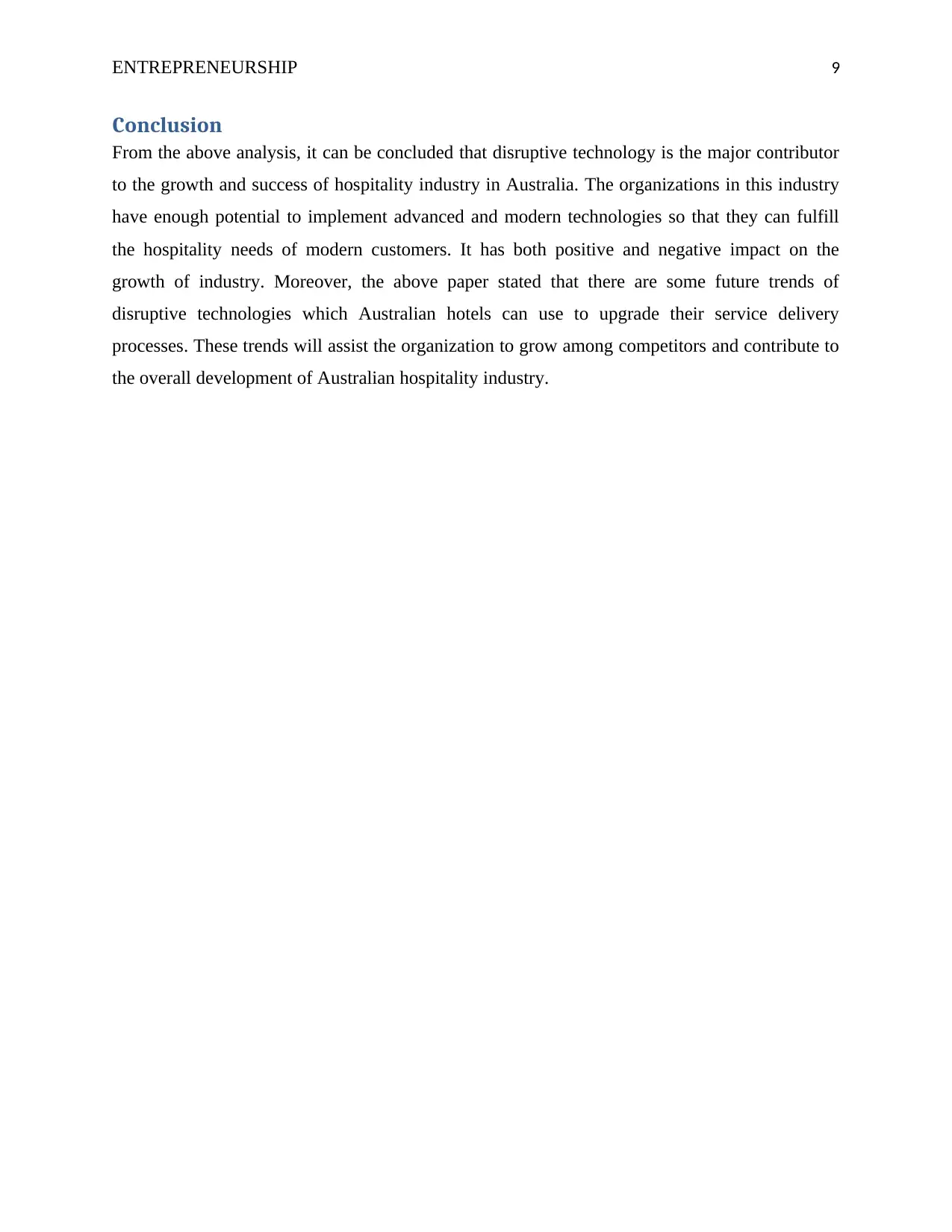
ENTREPRENEURSHIP 9
Conclusion
From the above analysis, it can be concluded that disruptive technology is the major contributor
to the growth and success of hospitality industry in Australia. The organizations in this industry
have enough potential to implement advanced and modern technologies so that they can fulfill
the hospitality needs of modern customers. It has both positive and negative impact on the
growth of industry. Moreover, the above paper stated that there are some future trends of
disruptive technologies which Australian hotels can use to upgrade their service delivery
processes. These trends will assist the organization to grow among competitors and contribute to
the overall development of Australian hospitality industry.
Conclusion
From the above analysis, it can be concluded that disruptive technology is the major contributor
to the growth and success of hospitality industry in Australia. The organizations in this industry
have enough potential to implement advanced and modern technologies so that they can fulfill
the hospitality needs of modern customers. It has both positive and negative impact on the
growth of industry. Moreover, the above paper stated that there are some future trends of
disruptive technologies which Australian hotels can use to upgrade their service delivery
processes. These trends will assist the organization to grow among competitors and contribute to
the overall development of Australian hospitality industry.
⊘ This is a preview!⊘
Do you want full access?
Subscribe today to unlock all pages.

Trusted by 1+ million students worldwide
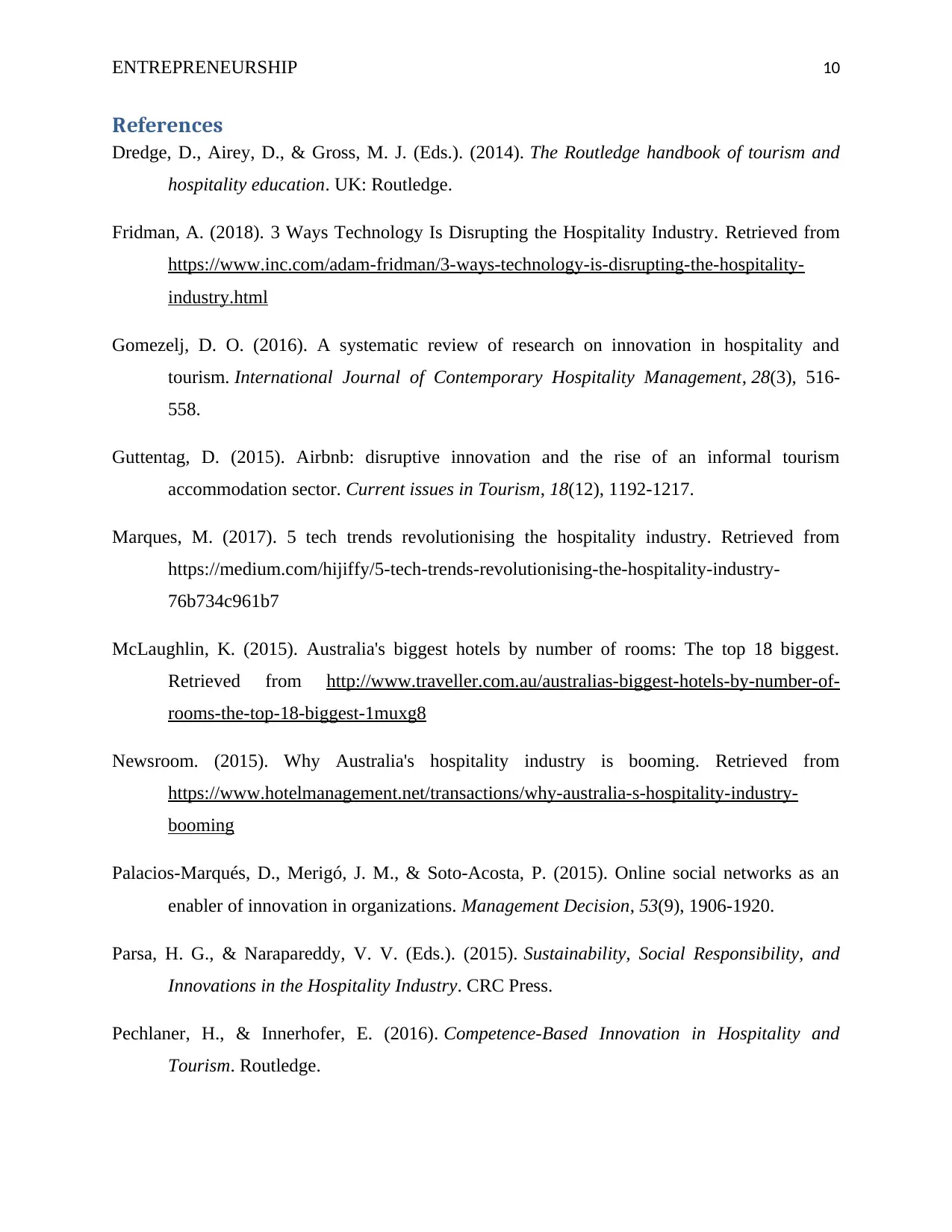
ENTREPRENEURSHIP 10
References
Dredge, D., Airey, D., & Gross, M. J. (Eds.). (2014). The Routledge handbook of tourism and
hospitality education. UK: Routledge.
Fridman, A. (2018). 3 Ways Technology Is Disrupting the Hospitality Industry. Retrieved from
https://www.inc.com/adam-fridman/3-ways-technology-is-disrupting-the-hospitality-
industry.html
Gomezelj, D. O. (2016). A systematic review of research on innovation in hospitality and
tourism. International Journal of Contemporary Hospitality Management, 28(3), 516-
558.
Guttentag, D. (2015). Airbnb: disruptive innovation and the rise of an informal tourism
accommodation sector. Current issues in Tourism, 18(12), 1192-1217.
Marques, M. (2017). 5 tech trends revolutionising the hospitality industry. Retrieved from
https://medium.com/hijiffy/5-tech-trends-revolutionising-the-hospitality-industry-
76b734c961b7
McLaughlin, K. (2015). Australia's biggest hotels by number of rooms: The top 18 biggest.
Retrieved from http://www.traveller.com.au/australias-biggest-hotels-by-number-of-
rooms-the-top-18-biggest-1muxg8
Newsroom. (2015). Why Australia's hospitality industry is booming. Retrieved from
https://www.hotelmanagement.net/transactions/why-australia-s-hospitality-industry-
booming
Palacios-Marqués, D., Merigó, J. M., & Soto-Acosta, P. (2015). Online social networks as an
enabler of innovation in organizations. Management Decision, 53(9), 1906-1920.
Parsa, H. G., & Narapareddy, V. V. (Eds.). (2015). Sustainability, Social Responsibility, and
Innovations in the Hospitality Industry. CRC Press.
Pechlaner, H., & Innerhofer, E. (2016). Competence-Based Innovation in Hospitality and
Tourism. Routledge.
References
Dredge, D., Airey, D., & Gross, M. J. (Eds.). (2014). The Routledge handbook of tourism and
hospitality education. UK: Routledge.
Fridman, A. (2018). 3 Ways Technology Is Disrupting the Hospitality Industry. Retrieved from
https://www.inc.com/adam-fridman/3-ways-technology-is-disrupting-the-hospitality-
industry.html
Gomezelj, D. O. (2016). A systematic review of research on innovation in hospitality and
tourism. International Journal of Contemporary Hospitality Management, 28(3), 516-
558.
Guttentag, D. (2015). Airbnb: disruptive innovation and the rise of an informal tourism
accommodation sector. Current issues in Tourism, 18(12), 1192-1217.
Marques, M. (2017). 5 tech trends revolutionising the hospitality industry. Retrieved from
https://medium.com/hijiffy/5-tech-trends-revolutionising-the-hospitality-industry-
76b734c961b7
McLaughlin, K. (2015). Australia's biggest hotels by number of rooms: The top 18 biggest.
Retrieved from http://www.traveller.com.au/australias-biggest-hotels-by-number-of-
rooms-the-top-18-biggest-1muxg8
Newsroom. (2015). Why Australia's hospitality industry is booming. Retrieved from
https://www.hotelmanagement.net/transactions/why-australia-s-hospitality-industry-
booming
Palacios-Marqués, D., Merigó, J. M., & Soto-Acosta, P. (2015). Online social networks as an
enabler of innovation in organizations. Management Decision, 53(9), 1906-1920.
Parsa, H. G., & Narapareddy, V. V. (Eds.). (2015). Sustainability, Social Responsibility, and
Innovations in the Hospitality Industry. CRC Press.
Pechlaner, H., & Innerhofer, E. (2016). Competence-Based Innovation in Hospitality and
Tourism. Routledge.
Paraphrase This Document
Need a fresh take? Get an instant paraphrase of this document with our AI Paraphraser
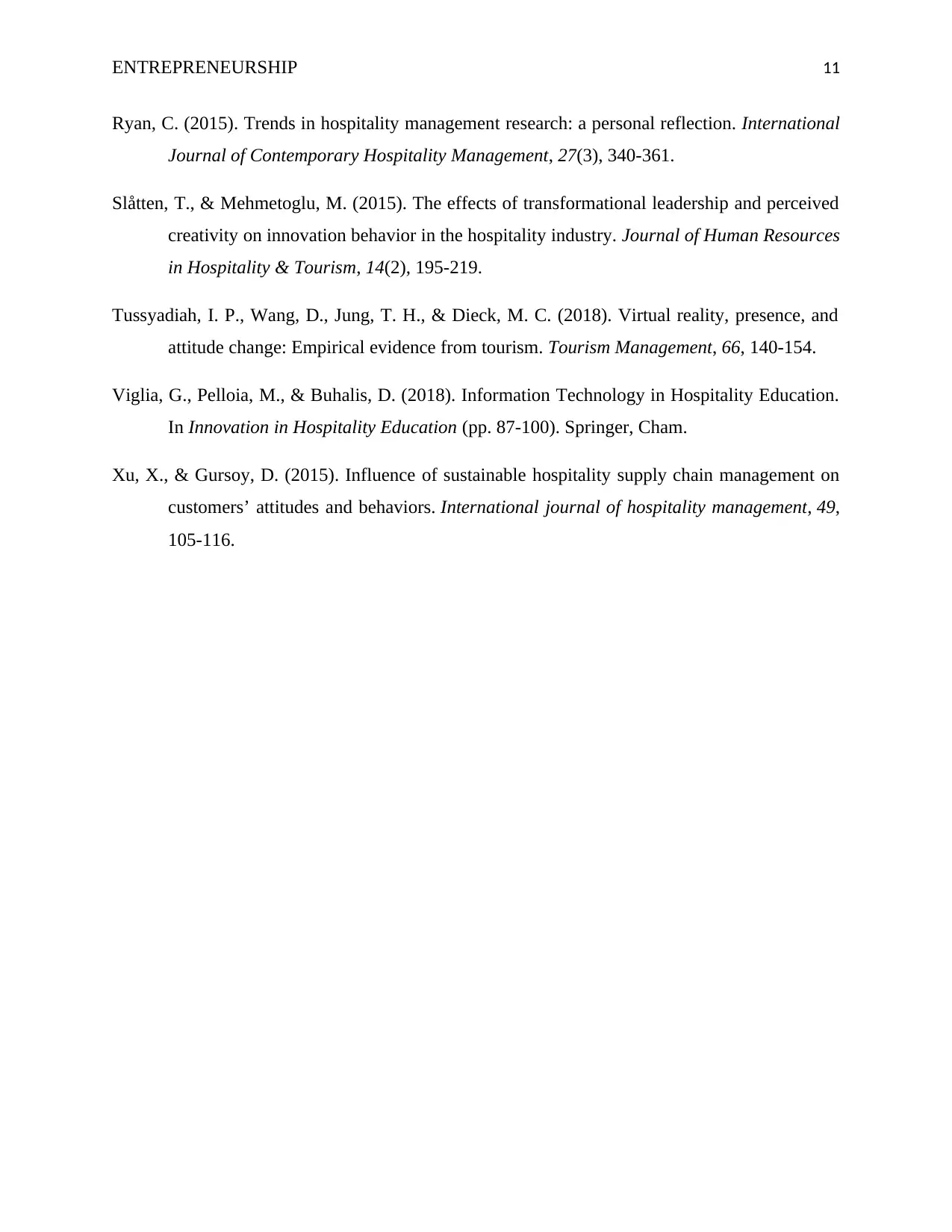
ENTREPRENEURSHIP 11
Ryan, C. (2015). Trends in hospitality management research: a personal reflection. International
Journal of Contemporary Hospitality Management, 27(3), 340-361.
Slåtten, T., & Mehmetoglu, M. (2015). The effects of transformational leadership and perceived
creativity on innovation behavior in the hospitality industry. Journal of Human Resources
in Hospitality & Tourism, 14(2), 195-219.
Tussyadiah, I. P., Wang, D., Jung, T. H., & Dieck, M. C. (2018). Virtual reality, presence, and
attitude change: Empirical evidence from tourism. Tourism Management, 66, 140-154.
Viglia, G., Pelloia, M., & Buhalis, D. (2018). Information Technology in Hospitality Education.
In Innovation in Hospitality Education (pp. 87-100). Springer, Cham.
Xu, X., & Gursoy, D. (2015). Influence of sustainable hospitality supply chain management on
customers’ attitudes and behaviors. International journal of hospitality management, 49,
105-116.
Ryan, C. (2015). Trends in hospitality management research: a personal reflection. International
Journal of Contemporary Hospitality Management, 27(3), 340-361.
Slåtten, T., & Mehmetoglu, M. (2015). The effects of transformational leadership and perceived
creativity on innovation behavior in the hospitality industry. Journal of Human Resources
in Hospitality & Tourism, 14(2), 195-219.
Tussyadiah, I. P., Wang, D., Jung, T. H., & Dieck, M. C. (2018). Virtual reality, presence, and
attitude change: Empirical evidence from tourism. Tourism Management, 66, 140-154.
Viglia, G., Pelloia, M., & Buhalis, D. (2018). Information Technology in Hospitality Education.
In Innovation in Hospitality Education (pp. 87-100). Springer, Cham.
Xu, X., & Gursoy, D. (2015). Influence of sustainable hospitality supply chain management on
customers’ attitudes and behaviors. International journal of hospitality management, 49,
105-116.

ENTREPRENEURSHIP 12
⊘ This is a preview!⊘
Do you want full access?
Subscribe today to unlock all pages.

Trusted by 1+ million students worldwide
1 out of 12
Related Documents
Your All-in-One AI-Powered Toolkit for Academic Success.
+13062052269
info@desklib.com
Available 24*7 on WhatsApp / Email
![[object Object]](/_next/static/media/star-bottom.7253800d.svg)
Unlock your academic potential
Copyright © 2020–2026 A2Z Services. All Rights Reserved. Developed and managed by ZUCOL.




